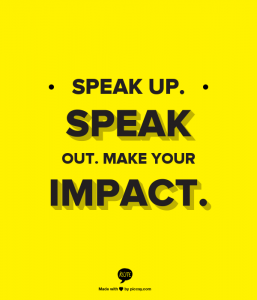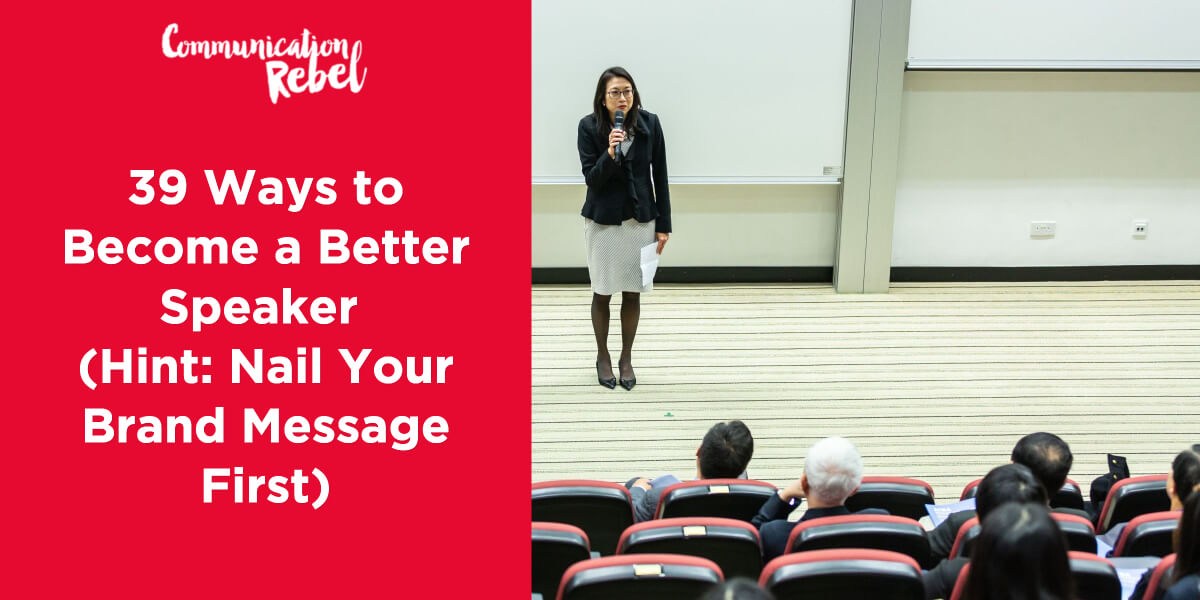39 Ways to Become a Better Speaker (Hint: Nail Your Brand Message First)
 So you want to be a better speaker?
So you want to be a better speaker?
It's a silly question especially if you've been reading my blog for any length of time. My goal is to help you be a better speaker, foster a deeper connection with your audience, and give you the ability to broadcast your message to the world.
The best way to become a better speaker is to have a message, to begin with. If your business owner that what you say stage better be aligned to your brand message otherwise you are wasting your time and energy thinking it's speaking is going to result in clients.
(If you need help figuring out what the heck your message is…check out the 3 Word Rebellion).
Once you've nailed that message to take every opportunity offered you to speak. If you are in a meeting raise your hand to contribute. At a workshop, step up to the stage when they ask for a volunteer. Go to networking events and practice your presentation 30-second commercial. Say “yes” to ever presentation opportunity that comes your way.
Do this to be a better speaker:
1. Say “yes” to every opportunity to speak.
2. Focus on connecting to your audience not speaking at your audience.
3. Focus on one big idea or goal for your audience.
4. Get to know your audience before you start preparing the presentation.
5. Tell stories.
6. Work diligently on your transitions between the main points.
7. Get feedback on your speaking from everyone.
8. Realize that not all feedback is created equally.
7. Expect to be nervous before you speak.
8. Smile – audiences love it when you smile.
9. Practice, practice, and then practice some more.
10. End early – your audience will love you for it.
12. Prepare early.
13. Ask questions throughout your presentation.
14. Craft an engaging introduction.
15. Have ONE clear call to action.
16. Know your introduction cold – it's when you will be most nervous.
17. Spend as much time on your introduction as you do on your conclusion. It's what your audience will remember most.
18. Don't let your PowerPoint serve as a teleprompter.
19. Make eye contact – it says to your audience “I see you.” Don't we all want to be seen?
20. Tie your conclusion in with your introduction.
21. Unbridle your enthusiasm.
22. Let your personality shine.
23. Find humor. Never add humor to your speeches.
24. Mistakes in presentations are larger in your own head than in the mind of your audience.
25. A few “umms” are not going to kill your presentation.
26. Gestures, vocal variety, rate, use of stage enhance your message.
27. Don't strive for perfection in speaking – strive for connection.
28. Remember speaking is not about you. It's about the audience.
29. Breathe before you start speaking (there's nothing worse than starting your presentation out of breath!)
30. Let your audience emotionally connect with your message not just logically connect.
31. Show up to your speaking venue early.
32. Test your technology before the presentation.
33. Have a Plan B if your tech does not work.
34. Have fun.
35. Be vulnerable – vulnerability is the key to authentic speaking.
36. Get a coach.
37. Take an improv class.
38. Your story, your message is important. Speak it!
39. Add your own suggestion in the comments.
I hope that one or more of these suggestions helped you become a better speaker. If one of these suggestions resonated with you, tell me which one did in the comments below. I look forward to reading them and reading other speaking success suggestions.



Love the tip here to focus on an over goal for your presentation. I know information can seem overwhelming to an audience. I only feel accomplished if they get the “main point”. I don’t really care if they miss the subtle stuff because they can go back through the presentation or do their own research.
Yes! It’s so important to have one clear goal for the presentation. Many times speakers have too many goals for their speech. I say you need one clear goal that is less than 10 words in length. If you get your goal across, you’ve been successful.
Wow Michelle, this is a comprehensive list! i can’t even isolate any favourite points – they are all great though I do spend time on #6 – the transitions. If I can do this well I am less reliant on my cue cards.
When i held my workshops regularly, I noticed the difference in the energy when I was looking at the people from when I looked down at my notes, however briefly. It was as if I lost them when I looked away! This is a great resource – thanks!
🙂
Lori
Thank you Lori for your wonderful words. Transitions are key – they are also the toughest part of your speech. if you master the transitions, you master having a fluid presentation plus you can be focused on your audience.
This is so key. Even as a teacher, I have to connect with my students or I’ve lost them in the first 3 minutes.
Yes. I think this more true for teachers. If you can’t relate to the students, they are just going to shut down. Thank you for the comment. 🙂
Great list, Michelle. Many of your points remind me of the writing of James Borg in his book on Persuasion — http://www.amazon.com/Persuasion-Influencing-People-James-Borg/dp/0137005075 . The book is very helpful for any communicator. You may want to check it out.
Thank you Dave! I’ll have to check out that book. I love reading more about communication.
You provided so many great resources here! I am always looking for better tips to be able to be a more powerful speaker and you have definitely provided me some more to think about, thanks so much!
Thank you – I’m glad the list was helpful. Good luck with your speaking journey. You’ll rock it – I’m sure. 🙂
Great list, very pragmatic! I would add this as number 39:
Remember it’s not about getting the words right; it’s about giving the words impact.
Love it Donn! Perfection is highly overrated! It’s all about the connection we make!
For me, #23 about finding humour – not adding it – really struck a chord. That crucial distinction really intrigues me.
Two items spring to mind that I’d add:
> Video or voice-record as many rehearsals as you can. That adds some “hassle” (though not much, if you use your mobile phone), but it also means you learn about your performance every time, so you improve much quicker.
> Practise purposeful pausing (which is the vocal equivalent of having few words on your slides). By pausing, your message comes across far more strongly, just like when using Haiku Deck (or a similar style) instead of bullet lists. Decker Communications recently shared a neat, practical way to ensure you pause often enough and long enough, which I’ve written about here:
http://remotepossibilities.wordpress.com/2013/03/10/when-you-speak-how-often-and-how-long-should-you-pause-the-answer-try-1-2-3/
By the way, I just downloaded your practical guide to rehearsing in 10 minutes a day, and I love it. Lots of great tips in there, so thanks for putting it out there! I recommend it to other people:
http://www.drmichellemazur.com/2013/01/the-practical-guide-to-practicing-your-presentation-in-10-minutes-a-day.html
Thanks for your comment Craig! Video and voice recording is a good one if you want to improve quickly. Sometimes it is hard to listen/watch yourself, but it’s worth it. Using your smartphone is a way to make it simple to make it happen.
Great article on pausing. I am working with a client now who is a delightful fast talker (like me), and we were just talking about pauses. We are working on overexaggerating the slowness of her pace so that when she does it normally she speaks a bit slower. Honoring the punctuation might help as well.
Glad you enjoyed the practice tips. It sprung from everyone telling your practice but no one telling your how.
Nice compilation. I liked striving for connection rather than perfection. And I suggest giving credit where credit is due. I hear too many speakers who don’t say where they researched as if it’s not plagiarizing if it isn’t on paper. Crafting smooth unobtrusive source citations is an artform and ethical. I enjoy your contributions to the field.
Hi Kathleen! It’s funny you mention giving credit where credit is due. I watched a webinar about speaking. The presenter talked about telling good stories. I’m looking at the slide thinking “This is Joseph Campbell’s hero’s journey.” The speaker went on and on explaining his points about a good storytelling without mentioning Campbell until the very end. Could not believe it. Citing sources is ethical and it also increases your credibility. Excellent point.
As someone who is looking at doing a lot more speaking I found this list great food for thought. Particularly loved no 2.
[…] books will also prove to be useful in areas of public speaking and it would also enhance the language skills within you. Therefore, if you are still not in a habit of reading books, try developing this habit […]
[…] books will also prove to be useful in areas of public speaking and it would also enhance the language skills within you. Therefore, if you are still not in a habit of reading books, try developing this habit […]
[…] books will also prove to be useful in areas of public speaking and it would also enhance the language skills within you. Therefore, if you are still not in a habit of reading books, try developing this […]